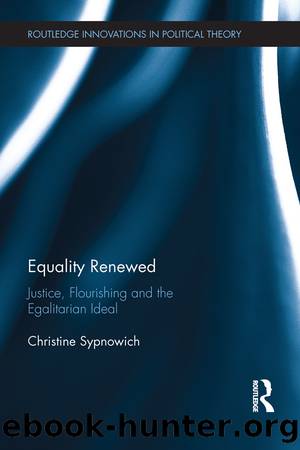Equality Renewed: Justice, Flourishing and the Egalitarian Ideal by Christine Sypnowich

Author:Christine Sypnowich [Sypnowich, Christine]
Language: eng
Format: epub
Tags: Philosophy, Sociology, Political Ideologies, Social Science, Political Science, Political, General
ISBN: 9781315458328
Google: ZiklDwAAQBAJ
Goodreads: 33602444
Publisher: Routledge
Published: 2016-12-19T00:00:00+00:00
Conclusion
This chapter noted that beneath the equality consensus there lurks some grave doubts about the radical position on economic equality. These doubts were distilled into three problems: the spectre of levelling down; the place of superior talent; and the role of personal attachments and commitments. I have suggested ways in which these challenges can be overcome. Strict equality is not ludicrous, but its attainment is only relevant insofar as human wellbeing is at stake. Sometimes human wellbeing requires departures from strict equality. Superior talent should be cultivated and recognised, but it should not enable a disproportionate share of wealth; a conception of egalitarianism in terms of wellbeing enables us to develop talent without developing disparities of wealth. The wellbeing of the talented, and of the rest of us who might enjoy the fruits of that talent, enables us to understand how strict equality of wealth is not necessarily the best way to realise the egalitarian ideal. Finally, the problem of how to weigh the demands of oneâs principles against personal attachments should be understood as symptomatic of an unequal society in particular. We seek to render individuals more equal in order to resource them in their pursuits, and to enable their full enjoyment of them. A focus on wellbeing rather than goods is helpful in resolving the dilemma of public and private.
Equality of individualsâ moral worth is a constant ideal; material equality, however, is more complex. Inequality is prima facie wrong; it is a kind of injustice. But the story cannot end there. The principle of equal human well-being, and our interest in living well, determines permissible inequalities in light of their capacity to add to peopleâs wellbeing. This means a radical redistribution of wealth from the advantaged to the disadvantaged, but not always with the result of strict equality. Wellbeing is a criterion by which we can both justify strict equality under certain well-defined conditions, as well as call for departures from strict equality when those conditions do not obtain.
One reason why egalitarians have been saddled with the problems of strict material equality is the focus on property and material goods, a preoccupation inherited from the libertarian conception of persons as owners and possessors. Egalitarian goals must refer not to what people have, but how they fare, in an ideal society. Moral individualism, prompted in part by libertarian critiques, is indispensable in determining what distribution best promotes individual well-being and the social culture with which individual wellbeing is inextricably connected. Egalitarianism is a contextualist ethics, even if it is also a principled one, but though universal lessons are hard to draw, we can distil our findings into a helpful image. Justice, equality and wellbeing are like points on a triangle: one starts with justice, which demands strict equality;76 equality is then modulated by qualitative considerations about wellbeing; high levels of wellbeing that are unevenly enjoyed, the fruits of serious economic disparity, must then answer to the court of justice and the egalitarian principles which justice entails. Individual wellbeing depends
Download
This site does not store any files on its server. We only index and link to content provided by other sites. Please contact the content providers to delete copyright contents if any and email us, we'll remove relevant links or contents immediately.
The Rule of Law by Bingham Tom(1690)
Philosophy of law a very short introduction by Raymond Wacks(1666)
Constitutional Theory by Carl Schmitt(1451)
The Quest for Cosmic Justice by Thomas Sowell(1358)
A Matter of Interpretation by Antonin Scalia(1310)
Hiding from Humanity: Disgust, Shame, and the Law by Martha C. Nussbaum(1200)
The Law by Frederic Bastiat(1164)
Philosophy of Law - A Very Short Introduction by Raymond Wacks(1125)
The Sovereignty of Human Rights by Macklem Patrick(1113)
Dignity, Rank, and Rights by Jeremy Waldron & Meir Dan-Cohen(1097)
An Introduction to the Philosophy of Law by Roscoe Pound(1095)
The Ages of American Law by Grant Gilmore(1086)
An Introduction to the Principles of Morals and Legislation by Jeremy Bentham(1083)
Superbia 2 by Bernard Schaffer(1080)
Emotional Dynamics of Law and Legal Discourse by Heather Conway John Stannard(1064)
The Law by Frédéric Bastiat(1022)
Zagrebelsky, Gustavo by La legge e la sua giustizia(1021)
Superbia (Book 3) by Schaffer Bernard(983)
Superbia (Book 2) by Schaffer Bernard(970)
